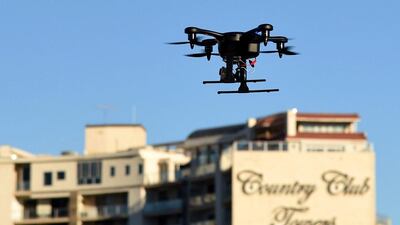Dubai wants to be the smartest city in the world by 2017.
This was the charter of the Dubai Smart Government Plan laid out last year. The government has been keenly trying out new technologies to help achieve this goal, and a firm step in this direction has been to develop services using unmanned aerial vehicles – more commonly known as drones.
Until not so long ago, drones were considered to be a public safety and security threat and their use seemed suited only to the military. But over the past years there has been a major change in perception towards drones, and they are slowly becoming a part of our lives.
Public entities across the world are adapting drone applications to add efficiency to their routine operations. London’s Metropolitan Police is planning to use drones for observation and surveillance. Similarly, police at the Fifa World Cup last year in Brazil also used surveillance drones to monitor crowds.
Drones are finding ready use in other fields as well. The Delft University of Technology in the Netherlands has developed a drone ambulance to provide emergency care to heart attack patients. This drone is controlled by a paramedic and is deployed in response to an emergency call, reducing the average time to receive care from about 10 minutes to one minute.
A key reason drones are managing to gain public acceptability has been the interest and involvement from the big industry players. About a year ago, the online retailer Amazon introduced the world to Prime Air, its drone-assisted delivery service. The company is banking on the drone technology to reduce the time it takes to deliver orders to its customers – even offering same-day delivery in some areas. The service is under technology trials and regulatory review.
Google, too, has been interested in the drone ecosystem. Google in April last year bought the solar drones and satellite maker Titan Aerospace. Then in August, the company announced successful tests of delivering small packages using drones in the Australian outback. Google calls this Project Wing and is running this initiative under its semi-secret research unit called Google X.
Similarly, the courier group DHL has invested in the parcelcopter propjet – a regular drone delivery service between the German mainland and Juist, a small island off Saxony.
The cumulative global market size for defence and commercial drones between 2013 and 2023 is estimated to be about US$98 billion, according to Business Insider, the tech news website. Of this, about 12 per cent would be purely for commercial and civilian applications.
However, the main stumbling block hindering the growth of the drones’ ecosystem is the regulatory environment. Although drone technology has evolved rapidly in the past few years, the regulatory framework to govern their use in civilian airspace is still in its nascent stages in most countries. The US Federal Aviation Administration on Sunday unveiled a proposal to permit businesses to use small unmanned aircraft, so long as they are flown at low altitudes by a person who is at least 17 years old, passes a knowledge test and gets an FAA certificate.
Flights wouldn’t be allowed out of sight of the operator or over crowds and could not exceed 160kph. The UAE Government sees drones as key to its smart government initiatives. To begin with, it wants to use drones to swiftly deliver government documents such as Emirates ID cards, driving licences and other permits to residents. This is aligned with the government’s aim to offer distributed services that reach residents rather than residents needing to reach out to the government.
There are also plans to develop specialised government-to-government drone services that can help in better collaboration across public entities.
With the government’s focus firmly on the drone technology, the regulatory and commercial aspects of the market are also expected to mature rapidly within the country. Regulations governing drone use are being drafted by the country’s cabinet in cooperation with the nation’s civil aviation authority. The government will also be looking at examples of other countries that already have stringent drone regulations in place, such as Canada.
It is widely expected that once the UAE drone law is released, all drones would need to be registered and licensed under recreational, commercial and scientific use categories. Further, the laws will also regulate the altitude and airways that the drones could use and the areas they could fly in. This will ensure that there are no interferences with operations at airports, commercial airlines, government buildings and similar sensitive locations.
By 2025, the Dubai government forecasts the economic effect of the drone industry to be in the tune of $8bn to $10bn. It also expects to establish the emirate as an important hub for the global drone industry by the turn of the decade.
In a bid to further boost the drone industry, in February last year, the UAE Drones For Good Award was launched – a $1 million prize for showcasing the best use of civilian drones for improving people’s lives. Its first winner, Gimball, by the Swiss start up Flyability, was awarded during this month’s UAE Government Summit for its spherical design and its search and rescue applications.
Other innovations that proved popular with the awards panel included Sanad, a drone developed in the UAE that can be used for life-saving missions, particularly during rescues at beaches; and Wadi Drone, another locally developed machine that can be used in wildlife conservation and environmental protection.
Abhinav Purohit is a UAE-based strategy consultant specialising in the telecoms, ICT and smart city domains.
Follow The National's Business section on Twitter

